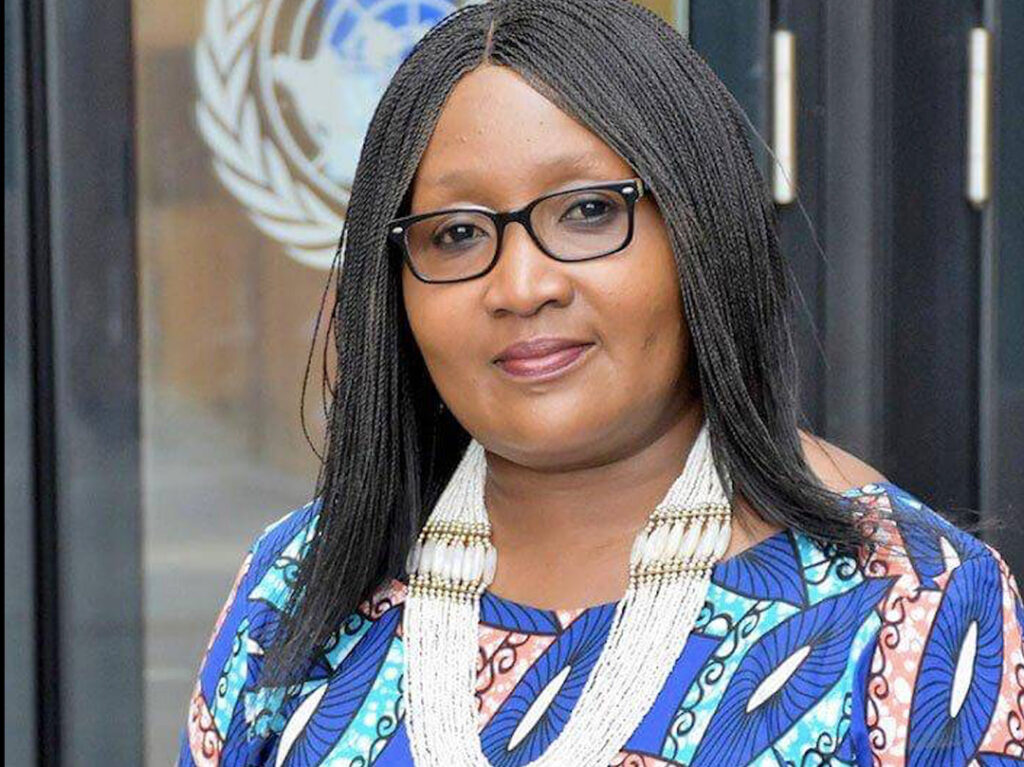The 54 environment ministers of Africa met in Addis Ababa 14-18 August in Addis Ababa. This session provided a platform to strengthen Africa’s collective engagement in the global environmental agenda, multilateral processes related to addressing climate change, desertification, nature and biodiversity loss and pollution. It ensured that the region is not only able to address challenges in these areas, but seize emerging opportunities for the sustainable development of the continent. Rose Mwebaza is Regional Director of UNEP-Africa, she is the special guest of Environews RDC. She answers questions from Alfredo Prince NTUMBA about the 19th session of the African Ministerial Conference on the Environment (AMCEN).
Environews RDC : Why is it important to organize the meeting of 54 African Ministers of the Environment in the run-up to COP 28?
Rose Mwebaza : The session provides a platform for strengthening Africa’s collective engagement in the global environmental agenda, multilateral processes related to combating climate change, desertification, nature and biodiversity loss, and pollution It ensures that the region is not only able to address the challenges in these areas but seize emerging opportunities for sustainable development of the continent. It is an opportunity for ministers to provide policy guidance for several upcoming key environmental events, including the twenty-eighth session of the Conference of Parties to the United Nations Framework Convention on Climate Change and the Africa Climate Summit; the sixth session of the United Nations Environment Assembly of the United Nations Environment Programme; Africa’s participation in the development of an international legally binding instrument on plastic pollution; Africa’s preparations for the sixteenth session of the Conference of the Parties to the United Nations Convention to Combat Desertification; preparations for the fifth session of the International Conference on Chemicals Management; and how Africa will respond to the implementation of the Kunming-Montreal Global Biodiversity Framework.
Environews RDC : What can Africa expect from this meeting? Especially since the resolutions of other similar meetings are lying around in the drawers?
Rose Mwebaza : The recent policy direction of the Conference is that a large focus of its work should support implementation. This session is already strengthening collaboration among the various institutions and enhance implementation of regional and global environmental frameworks in order to address the environmental challenges facing the continent. Our theme this year “Seizing opportunities and enhancing collaboration to address environmental challenges in Africa” envisions scaling up of existing initiatives, taking advantage of new opportunities as well as enhancing collaboration and strengthening the role of those institutions that support implementation of regional and global outcomes.
The session will also strengthen the work of the Conference in its contribution to the region’s environment and sustainable development agenda. This includes addressing emerging environmental issues, enhancing collaborative efforts with partners and stakeholders, beefing up its financial base (Trust Fund of the Conference), and review of proposals to strengthen its rules of procedure, as was decided by the resumed eighteenth ordinary session.
The expert group will bring the above matters to the attention of ministers, providing drafts of the declaration, decisions, and key messages to ministers for their consideration during the ministerial meeting.
Some of the activities resultant from past decisions include the following :
African Forum of Environment Protection Agencies; The resumed eighteenth ordinary session of the African Ministerial Conference on the Environment, in Decision 18/1, agreed to establish a forum that brings together heads of environment protection agencies in Africa; The Africa Office of the United Nations Environment Programme, in collaboration with the Rwanda Environment Management Authority, hosted the first formal roundtable meeting for the Africa Forum of Environment Protection Agencies in Kigali, Rwanda, 7 to 8 March 2023. Participants agreed agree on the nature, structure and operational modalities of the forum of environment protection agencies in Africa and establish a common framework for scaling up science-policy interface, to address environmental challenges in Africa.
Phasing out of open burning of waste in Africa; During the resumed eighteenth ordinary session of the Conference, member states, through decision 18/1(b) committed to reducing open dumping and burning of waste in Africa and to promote the use of waste as a resource for value and job creation so as to build more inclusive and sustainable economies. The multi-stakeholder partnership for the elimination of open burning of waste in Africa that would serve as a key implementation vehicle for the decision was officially launched at the twenty-seventh conference of the parties to the United Nations Framework Convention on Climate Change in Sharm el Sheikh in November 2022.
Africa Environment Partnership Platform; A representative of the African Union Development Agency will give a short presentation on the progress made in implementing this initiative.
Circular economy: The seventeenth ordinary session of the African Ministerial Conference on the Environment, through decision 17/1(III) agreed to develop a regional programme to promote and scale up the circular economy and, in that regard, requested the African Union Commission, the United Nations Environment Programme, the regional economic communities and other partners to support that programme. It also worth noting that the African Circular Economy Alliance has been established as a government-led coalition of African nations with a mission to spur Africa’s transformation to a circular economy that delivers economic growth, jobs, and positive environmental outcomes.
These are just a few examples of decisions that are being implemented. The decisions of this forum inform the plans and environmental programmes implemented by governments throughout the continent.
Environews RDC : The question of climate finance remains pending. Some countries that have forests complain about the carbon tone rate on the market. How does UNEP work to help countries benefit from their forests?
Rose Mwebaza : UNEP’s Climate Finance mission is to actively works to develop innovative solutions to shift capital towards more sustainable forest and agri-food systems. In doing so, we aim to develop into a leading hub, facilitator and public-private platform to generate an inclusive social and economic paradigm shift towards making sustainable land use ultimately the ‘new norm’. Through dedicated funds and facilities, UNEP is supporting a shift in financial metrics
and flows to reduce consumer footprints on forests while supporting partners and Member States in deforestation-prone landscapes to embrace practices with less impact on forests.
The REDD+ Initiative is reducing deforestation through the conservation and sustainable management of forests and supporting developing countries in turning their political commitments, as represented in their Nationally Determined Contributions, into action on the ground.
Envionews RDC : Plastic pollution remains a real problem in Africa. African States do not have sufficient financial means to fight against this pollution. How does UNEP intend to help African states move in the right direction?
Rose Mwebaza : The UNEP study titled “Turning off the Tap: How the world can end plastic pollution and create a circular economy” records that plastic pollution can be reduced by 80% by 2040 if countries and companies make deep policy and market shifts using existing technologies to drive circularity. The study notes that market shifts towards promoting “reuse” can reduce plastic pollution by 30% while enhancing “recycling” as a venture can reduce pollution by a further 20%, while reorientation and diversifying by replacing plastic products with alternative materials can result in an additional 17% reduction. The possible economic opportunities are also immense, with up to $1.27 trillion in direct savings and a net increase of 700,000 jobs by 2040.
The efficiency of the proposed legally binding instruments for Africa depends on the way its negotiators will frame and design the problems of the plastic crisis from the regional perspective. The Africa Region is adversely affected due to a variety of factors, including a weak infrastructure for waste management, resources and capacities as well as lack of awareness on the implications of plastic pollution. Consequently, making it to be far more negatively impacted than any other region.
We stand ready to support member States to deliver a global agreement that can harmonize, coordinate, and provide regulatory measures to address plastic pollution holistically and comprehensively.
Environews RDC : Last year, African environment ministers pledged to eliminate plastic pollution. 1 year later, how do you assess this decision?
Rose Mwebaza : Addressing the impacts of plastic pollution on health in Africa requires comprehensive measures, including improved waste management practices (designed around reduction, reuse and recycling initiatives), public awareness campaigns and policy interventions. By mitigating plastic pollution and promoting sustainable alternatives, it is possible to protect human health, preserve ecosystems, and foster sustainable development in the region. The following are some of the actions taking place.
- 37 African countries are regulating plastic bags, some countries including Rwanda and Seychelles have bans on a list of single-use items, and some countries implemented bans in specific geographic areas such as national parks and protected areas.
- Some countries including South Africa and Kenya are implementing mandatory Extended producer responsibility (EPR) which aims to place financial burden on producers and importers of plastic products including packaging.
- The informal waste collection sector involving waste pickers, plays a critical role in the recycling sector by collecting up to 90% of paper and plastic recyclable materials. However, they are often marginalised, rely on irregular incomes and face harmful working conditions. Some countries are beginning to integrate the informal sector into the waste management sector. South Africa provides a good example of progress in this area
Environews RDC : In Senegal, 54 ministers recommended collaboration with African ministers of finance and economic planning. What has been done so far?
Rose Mwebaza : The Conference of Ministers of Finance, Planning and Economic Development at its fifty-fifth session held in Addis Ababa in March 2023, committed to collaborate with the African Ministerial Conference on the Environment in forging collective efforts and actions to accelerate socio-economic and environmental development and green investments in Africa and the mobilisation of climate finance.
Thank you Madam Mwebaza !
Note that this conference was under the theme « Seizing opportunities and strengthening collaboration to address environmental challenges in Africa ».
Alfredo Prince NTUMBA






